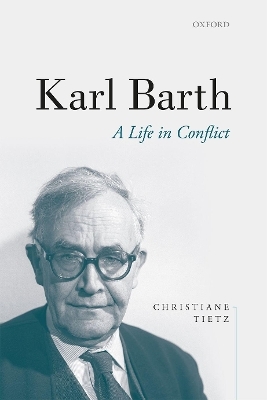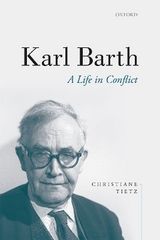Karl Barth
Oxford University Press (Verlag)
978-0-19-885246-9 (ISBN)
From the beginning of his career, Swiss theologian Karl Barth (1886-1968) was often in conflict with the spirit of his times. While during the First World War German poets and philosophers became intoxicated by the experience of community and transcendence, Barth fought against all attempts to locate the divine in culture or individual sentiment. This freed him for a deep worldly engagement: he was known as "the red pastor," was the primary author of the founding document of the Confessing Church, the Barmen Theological Declaration, and after 1945 protested the rearmament of the Federal Republic of Germany. Christiane Tietz compellingly explores the interactions between Barth's personal and political biography and his theology. Numerous newly-available documents offer insight into the lesser-known sides of Barth such as his long-term three-way relationship with his wife Nelly and his colleague Charlotte von Kirschbaum. This is an evocative portrait of a theologian who described himself as "God's cheerful partisan," who was honored as a prophet and a genial spirit, was feared as a critic, and shaped the theology of an entire century as no other thinker.
Christiane Tietz studied Mathematics and Protestant Theology in Frankfurt/Main and Tübingen. She worked as assistant of Eberhard Jüngel and did her PhD with him on Dietrich Bonhoeffer. Her PostDoc thesis was on a Christian concept of self-acceptance. She was awarded a Heisenberg Stipend by the German Research Foundation. From 2008 until 2013 she worked as Full Professor for Systematic Theology and Social Ethics at the University of Mainz/Germany. Since 2013 she has been Full Professor for Systematic Theology at the Institute of Hermeneutics and Philosophy of Religion at the University of Zurich/Switzerland. She has been a visiting lecturer or research scholar in Cambridge, Chicago, Heidelberg, Jerusalem, New York, and Princeton. She is a member of the editorial board of numerous journals and book series, and a judge for the Karl Barth-Prize and a member of the Advisory Board of the Karl Barth-Foundation, Basel. Victoria J. Barnett (Translator) was Director of the Programs on Ethics, Religion, and the Holocaust at the United States Holocaust Memorial Museum, Washington, DC, from 2004 to 2019. She also served as General Editor of the Dietrich Bonhoeffer Works English Edition from 2004 to 2014. She is the author of For the Soul of the People: Protestant Protest under Hitler (Oxford University Press, 1992) and Bystanders: Conscience and Complicity during the Holocaust (Greenwood Press, 1999). She is the translator of several works, including Wolfgang Gerlach, And the Witnesses were Silent and Christiane Tietz, Theologian of Resistance: The Life and Thought of Dietrich Bonhoeffer, and is the author of numerous articles and book chapters.
1: "I Belong To Basel": 1886-1904
Guildmaster, Pastors and Scholars: Barth's Ancestors
A Strict Love for Truth and Christian Discipline: His Parents
"A Great Great Joy": Childhood and Youth
2: "This Obscure Desire toward a Better Understanding": 1904-1909
The Decision to Study Theology
Student in Bern
Wearing the Colors and Noncombative: In the Zofingia Association
"Very Diligent and Quite Capable": Student in Berlin
Once More in Bern and Then Tübingen
Finally in Marburg
His Work for Die Christliche Welt
3: "Stumbling Up the Steps to Calvin's Pulpit": 1909-1911
Vicar in Geneva
Quite Demanding: The First Confirmation Instruction
Theologian in the Congregation
"In Such a Dreadfully Pious Environment"
A Daughter from a Good Home: The Engagement to Nelly Hoffmann
Farewell to Geneva
4: "The Red Pastor": Safenwil, 1911-1921
"This System of Employment Must Fall": Workers and Socialists
A Theological Friendship: Eduard Thurneysen
"The WorldWithout Gods": The First World War
"An Open House": Family Life
5: "A Book for Those Who Were Also Concerned": The First Epistle to the Romans, 1919
Human Religion and the Divine Word
"Like a Bomb on the Playground of the Theologians"
"Without Windows to the Kingdom of Heaven": The Tambach Lecture
6: "To Always Work Somewhat Faster": Göttingen 1921-1925
From Swiss Pastor to German Professor
"Unavoidable Nonsense of the Academic Business"
"Almost Like a Buddy": Barth with His Students
"Lively Combat": Emanuel Hirsch and Other Colleagues
"Stranger from a Neutral Place": Karl Barth and the Germans
7: "Not a Stone Left Standing": The Second Version of the Epistle to the Romans, 1922
A Critical Turn
The new version of the Epistle to the Romans
Critics and Admirers
What is Dialectical Theology?
Dialectical Traveling Companions: Brunner, Bultmann, Gogarten
Fifteen Questions and Sixteen Answers: The Controversy with Harnack
8: "The Need for Thinking Further": Münster 1925-1930
A Call and a Momentous Encounter
Received with Joy, Departing in Discord
In the Tunnel of the Semester
Return to Bern?
"The Church, the Church, the Church": Encounters with Catholicism
Riding, House Music and Travel
9: A Troubled 'Ménage à Trois': Charlotte von Kirschbaum
A Long-Guarded Secret
"I Never Knew That There Could Be Something Like This"
"A Certain Double Life"
Three Under One Roof
10: "A Swissman in the Middle of Germany": Bonn 1930-1935
Working on Theology
The Humanity of God
First Conflicts with German Nationalists: the Case of Günther Dehn
Now's the Time for the Social Democrat Party: 1933
Warnings to the Church and a Letter to Hitler
1933 as a Year of Crisis in the Barth Household
The Theological Dimension of Barth's Relationship to Charlotte von Kirschbaum
Attacks on the Swissman
Against the "German greeting"
The Break with his Dialectical Travelling Companions
The Barmen Theological Declaration
Suspension, Ban on Public Speaking, Dismissal
11: "We Who Can Still Speak": Basel 1935-1945
Life Goes On: Professor in Basel
International Honors and Lack of Appreciation
Battle for the Confessing Church
Anti-Appeasement: The Call to the Czechs to Resist
The Political Responsibility of a Christian
Church Struggle and Refugee Aid
Ecumenical Silence at the Onset of the War
Family Intrigues and Grief
A Call for Military Resistance, and Swiss Censorship
A Friend of the Germans, Nonetheless
12: "In Political Respects a Dubious Will-o'-the-Wisp": Basel 1945-1962
War's End and the Declaration of Guilt
Back to Bonn and, Once Again, State and Church Issues
"God's Beloved Eastern Zone": Against Anti-Communism
A Pacifist after All? Protest against Rearmament and Nuclear Weapons
Yes to Ecumenism, but without the Catholics
The Master with the Crumpled Tie
The Discovery of Optimism in Prison
Courage, Tempo, Purity, Peace: Confession to Mozart
Children, Grandchildren, and the Rejection of His Desired Successor
13: "The White Whale": Church Dogmatics
"A Conceptual Helix": Barth's Monumental Work
The Threefold Form of the Word of God
God's Three Modes of Being
"God is" means "God loves"
Whom God Elects
What God Commands
Why God Wants the Creation
Nothingness and the Shadow Sides of Creation
The Threefold Office of Christ and the Three Forms of Sin
The Light Shines Where It Wishes
The Baptism of Water and of the Spirit
14: "All Things Considered, A Little Tired": The Final Years, Basel 1962-1968
"Fantastic": A Calvinist in the United States
"Rules for Older people in Relation to Younger"
"As If Deeply Veiled": Charlotte von Kirschbaum Must Move Out
"Separated Brothers": In Conversation with Rome
A Late Friendship with Carl Zuckmayer
The Uncompleted Mammoth Work
At the End of His Life Journey
Epilogue
Chronology
Bibliography
Index of Names
Index of Subjects
| Erscheinungsdatum | 18.03.2021 |
|---|---|
| Übersetzer | Dr Victoria J. Barnett |
| Zusatzinfo | 50 |
| Verlagsort | Oxford |
| Sprache | englisch |
| Maße | 160 x 240 mm |
| Gewicht | 838 g |
| Themenwelt | Literatur ► Biografien / Erfahrungsberichte |
| Sachbuch/Ratgeber ► Geschichte / Politik | |
| Religion / Theologie ► Christentum ► Kirchengeschichte | |
| ISBN-10 | 0-19-885246-0 / 0198852460 |
| ISBN-13 | 978-0-19-885246-9 / 9780198852469 |
| Zustand | Neuware |
| Informationen gemäß Produktsicherheitsverordnung (GPSR) | |
| Haben Sie eine Frage zum Produkt? |
aus dem Bereich




